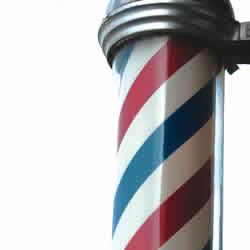In urban and African-American communities, the barbershop can be a sanctuary of sorts, especially for young men. I recently went to the barbershop myself for a haircut—just a normal one, not a “doo”—and I had the chance to talk a little barbershop theology.
A doo is a big deal to the urban male, especially African-American youths. Whether your doo is the fad, the braids, or the Afro, you’re making a statement by it. The hairstyle is coordinated with hip-hop and urban fashion that can tell you some things about how you see yourself and the world.
The barbershop lends itself to open talking of all kinds—hurtful or helpful. There is a verbal put-down game that used to be called “the dozens” and now is called “snapping.”
While the barbershop is generally a safe place to play the game, the hurtful words can lead to physical fights. Fortunately, the primary reason boys and men are in the barbershop is all about style. Talking is a bonus when it leads to something better than fighting.
Going to the Streets
My barber, Raydell, blew my cover and announced that I’m a pastor. A couple of urban young men heard him and asked me if that was true. I said yes and asked them what they thought about the church.
“We’re feelin’ God and all that, but we ain’t feelin’ the church,” said the first youth. “You see, the problem is that the church won’t come to the streets where we’re at, you know? I think the church expects us to come to them, but we need the church in the streets!”
The young man in the chair next to me then chimed in.
“I grew up without my father and I really struggled with that. I know that it’s because of God that I’m still here, but it’s hard sometimes for me to hear from preachers. Some preachers are hustling themselves, and then the ones that aren’t, I wonder if they can really deal with what me and these other shorties out here are going through.”
Then, like hip-hop emcees trading the microphone, the other young man came back into the conversation.
“You see, I read the Bible to get understanding. A lot of my friends out here are reading the Bible and other holy books. I know that there is something spiritual about numbers, such as the number three having meaning because God is three in one,” he said. “The problem is that many of us are hungry for something spiritual but we not going to church. I bet that 80 percent of the young brothers out here in the streets between the ages of 15 and 23 are not in church. But, we need God. I know I need God.”
Barbershop Church
I looked at both of them.
“We’re experiencing church in the streets right now. This barbershop has become a sanctuary because we’re attempting to get real about God, our desperate need for Him, and how our lives can be changed through relationship with Him. You said that you can’t relate to pastors, but you’re talking to me right now. Maybe in some way we’re here getting more than haircuts. We’re having church!”
We continued in conversation a little longer and then it was time for me to go. I gave them both my business card and invited them to my church. one, not a “doo”—and I had the chance to talk a little barbershop theology.
To be honest though, I really enjoyed the church service we had in the barbershop. I make a point to stop by the barbershop now just about every week, and sometimes I actually need a haircut.
_______
Efrem Smith is the senior pastor of The Sanctuary Covenant Church (sanctuarycovenant.org) and the founder of Unity Storehouse Ministries (unitystorehouse.com). He is the author of Raising Up Young Heroes an Barbershop Church




